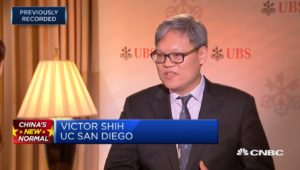
The first five years of president Xi Jinping‘s rule saw many promises on financial and economic reforms. But he fell short on delivering on those promises, says financial and political analyst Victor Shih to Quartz.
Quartz:
[W]hile Xi has paid market reforms plenty of lip service, he has yet to deliver on them, as noted by Victor Shih, a professor of political economy at the University of California-San Diego. “From everything we’ve seen, despite his rhetoric about reform and opening, Xi Jinping heavily favors a strong state sector,” says Shih. That raises another possibility: Perhaps China’s chief economic woes stem from Xi’s having too much power, rather than too little.
“Whatever biases he has will continue to be reflected in the Chinese government’s policies for the duration of his tenure, which now will likely stretch well into the next decade,” says Shih.
Xi has some good biases—for instance, his seeming commitment to cleaning up air pollution in northern China. But he also has a bias toward heavy state intervention into the economy, as is evident in his efforts to fix problems like dangerous debt levels and deflationary overcapacity—the latter via much-touted “supply-side reform.” During Xi’s tenure, the government took action to control the stock market, bond market, and foreign exchange markets, as well as the supply of coal, steel, and cement, Shih points out.
Victor Shih is a speaker at the China Speakers Bureau. Do you need him at your meeting or conference? Do get in touch or fill in our speakers’ request form.
Are you looking for more financial analysts at the China Speakers Bureau? Do check out this list.



